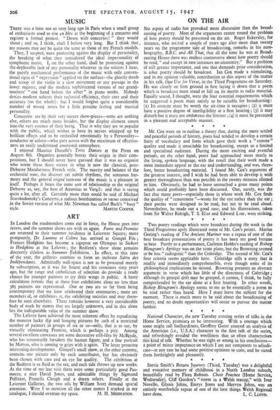MUSIC
THERE was a time not so very long ago in Paris when a small group of enthusiasts used to rise en bloc at the beginning of a concerto and register a formal protest. " Down with concertos! " they would shout ; and so, I think, shall I before very long. But I think that - my reasons may not be quite the same as those of my French models. They, I suspect, were protesting against the display of personality, the breaking of what they considered the ideal impersonality of symphonic music. I, on the other hand, shall be protesting against the deplorable lack of any personality whatever in the soloists I hear, the purely mechanical performance of the music with only conven- tional signs of " expression " applied on the surface—the ghastly throb and scoop of the violin in a slow movement or any passage in the lower register, and the modern sophisticated version of our grand- mothers' " one hand before the other " in piano works. Nobody denies modern soloists their technical efficiency, their care and their accuracy (on the whole): but I would forgive quite a considerable number of wrong notes for a little genuine feeling and musical personality.
Concertos are by their very nature show-pieces—some are nothing else, others are much more besides, but the display element enters into the very essence of their being. That is why they are so popular with the public, which wishes to have its nerves whipped up by brilliant effects and to be enthralled emotionally by a Personality— conductor or soloist—who puts across with the maximum of effective- ness an easily understood emotional atmosphere.
I enjoyed Maurice Durufle's Trois Danses at the Prom on August 8th. Organists generally betray their origin in their com- positions, but I should never have guessed that it was an organist who wrote these three essays in what is now the classical, post- Debussy Mandarinese French style. The suavity and balance of the orchestral tone, the discreet yet subtle rhythms, the sensuous har- mony and the general soigné turn-out of the music is a pleasure in itself. Perhaps it bears the same sort of relationship to the original Debussy as, say, the best of Ausonius to Vergil : and that is saying quite a lot, after all. Certainly more than could be said of Michael Starokadomsky's Concerto, a tedious bombination in vacuo conceived in the Soviet version of what Mr. Newman has called Bach's " busy "


































 Previous page
Previous page